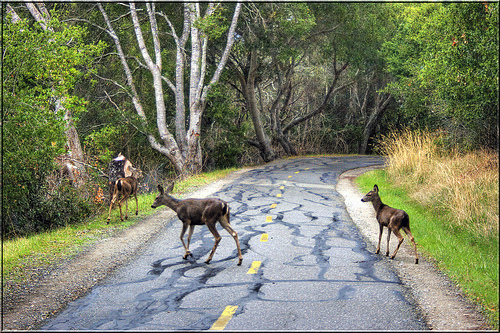“Compassion and happiness are not a sign of weakness but a sign of strength.” ~Dalai Lama
Showing compassion is one of the best ways to make the world a better place.
It isn’t always easy to have compassion for people, if they’ve hurt you, don’t see things the way you do, or seem to cause many of their own problems. It’s also easy to forget about certain people—people who live on the street, people who don’t have the voice to speak out, and sometimes even ourselves.
I freely admit that my compassion levels plummet in some of those cases, and I end up feeling tremendous guilt when I realize what a beast I’ve been. It’s something I work at.
I think most of us could also put a little more thought into showing compassion for animals and the world around us. They are just as worthy, and the act just as important and rewarding.
Compassion is like a muscle; the more you work it, the stronger it becomes. Here are a few ways simple ways to work that muscle and make the world a better place:
1. Remember that everyone’s litter is our litter.
It’s so easy to walk past an empty packet of whatever discarded on the floor and pretend it’s not there, consciously or unconsciously.
Everyone must be acutely aware of our rapidly changing environment. We can see it all around us as we become increasingly urbanized. We see it, or rather don’t, as blue skies are replaced with a thick haze of pollution.
The simple act of picking up that bit of trash and depositing it in the nearest bin is an enormous act of compassion for our planet. Keeping it free from pollutants (that can harm or kill wildlife) is a small and loving step that benefits the world around you.
It’s also compassionate to others and ourselves since millions of tax dollars are spent picking up litter each year.
To learn more, visit Keep America Beautiful: Litter Prevention, Waste Reduction, Beautification
2. Help the strays.
Stray animals aren’t any less living beings just because they don’t have a home, the same way people living on the streets aren’t any less human because they too are homeless.
It’s always best to contact local animal welfare agencies if you do see a wandering stray. Odds are, someone lost their pet and is starting to worry. If it is a stray it may be scared, sick, or injured, meaning it needs your help.
Resist the urge to shoo it away and go about your day. They might be feeling lonely or are just really pleased to see you.
I’ve always felt that ignoring the random cat that wanders up to you meowing away is like ignoring a person who greets you with open arms. They don’t care if you haven’t shaved or are still in your slippers. It’s great to see you.
Just remember to approach cautiously so you don’t scare the animal or put yourself in danger.
To learn more, visit The Humane Society of the United States: What to Do If You Find a Stray Pet
3. Give the Earth a drink.
You should keep houseplants and gardens sufficiently hydrated anyway, but I understand what it’s like to look out at your thirsty garden and think “I’ll sort it out tomorrow.” It’s funny how tomorrow ends up turning into next week.
Plants, like us, are living things that depend on water to survive. Imagine if you were feeling a bit on the dry side, wilting slightly, and you were denied a cool glass of water until a few days later. You’d probably be crawling on the ceiling by then.
Sure, plants have the benefit of rain, but not all of the time. During the summer, they need us to put aside the “I’ll do it later” thoughts and act out of the sheer understanding that they really do need a good soak.
To learn more, visit TLC, How Stuff Works: How to Water Plants/Water Conservation
4. Don’t squish the spider!
Admittedly, some spiders can be dangerous to us—if in doubt, call animal welfare and keep your distance—but most of the time we get scared simply because of how they look.
Spiders are beautiful and amazing creatures. Even if like me, you’re arachnophobic, I implore you to swallow some of that fear and learn about them.
They’re as diverse and skilled and creative as we are; they have families they provide for and they play just as an important role in our ecosystem as every other creepy-crawlers in this world. In fact, they control the insect population. (If you don’t love flies, killing spiders is highly counterproductive.)
If you come across a spider, allow this thought to run through your mind before you dispatch it: how would you feel if a giant foot/newspaper/swatter/etc. came crashing down on you?
We’re much larger than spiders are, so we don’t really have all that much to worry about. No matter how scary they look.
To learn more, visit The Xerces Society: for invertebrate conservation.
5. Drive with care.
Our world is crisscrossed with roads cutting through areas of land that were once barely populated by people. Connectivity is important, but it’s also crucial to remember that many of the highways constitute what used to be animals’ homes and territory.
Keep your eyes open for warning signs about animals crossing. These signs indicate a very real possibility. It’s vital for your safety as much as, say, a deer’s to slow down. If you hit a large animal at speed or lose control of the vehicle, neither of you will fare very well.
Even clipping an animal with the car can cause it severe damage and suffering. If you do hit an animal, try to stop in a safe place and call animal welfare, the same way that you’d call an ambulance if you hit a person.
It’s not just large mammals that are at risk either; smaller mammals like foxes, rabbits and badgers, birds and domesticated animals too, are all exposed to the possibility of being seriously injured or killed on the roads.
When you’re next stuck in a traffic jam, look out onto the gutters of the roadside and see how many dead birds and mammals you can spot. They were trying to get from A to B too, just like us. (They may even have been attracted to the road by litter, bringing us back to where we started.)
To learn more, visit Vegan Reader: 5 Tips to Prevent Road Kill
__
We can easily adapt the image of the Buddhist monk sweeping his path as he goes to our own busy lives. All it requires is a bit of extra attention to our environment.
If you’re as passionate as I am about the natural world, you could support a local charity through donations and/or volunteering. You could even take the plunge and go vegetarian. (It’s not that scary, honest.)
Compassion and its benefits extend beyond consideration of human life. It’s one of our most defining qualities as human beings, and we have countless opportunities to express it to the world around us.
About Sam Russell
Sam Russell is a young writer from the southeastern corner of the UK. He’s a cynic by nature trying to prove that cynics can be happy and positive, too. Visit his blog at http://cackhanded.wordpress.com/.














 Though I run this site, it is not mine. It's ours. It's not about me. It's about us. Your stories and your wisdom are just as meaningful as mine.
Though I run this site, it is not mine. It's ours. It's not about me. It's about us. Your stories and your wisdom are just as meaningful as mine. 